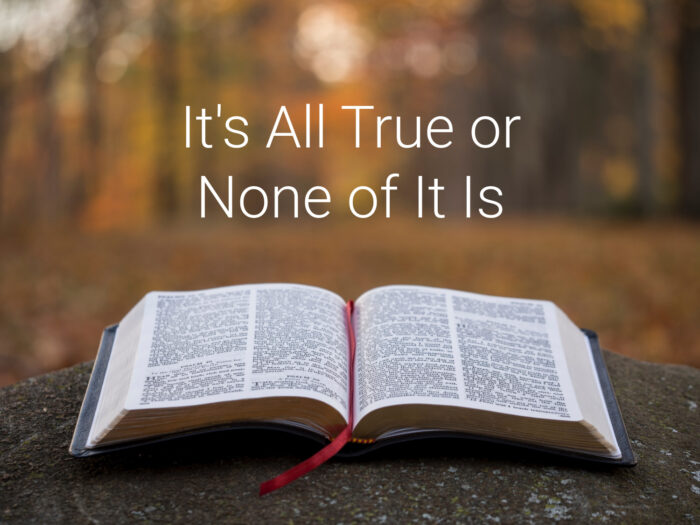Capturing Our Thoughts
What are you thinking about right now? At this very moment? We are all thinking all of the time. It’s not like we can’t think. The question is what are we thinking?
Have you ever stopped to consider how every sin, wrong attitude, and bad habit begins first with a single thought?
It is that point in time, when that first thought comes, that we should harness it and take control. Instead, all too often, we follow the thought off into the wilderness, where we allow it to run free and take us wherever it will. Well, at least I do. I won’t presume to speak for you!
Think with me, if you will, about the sin of worry. I guess this is rarely viewed as a sin anymore. Although, if we say we follow Christ and we take a moment to be honest with ourselves, we must recognize worry and anxiety for what they are: A blatant lack of trust in our faithful God.
But the anxiety and worry that steals our peace begins with a thought. “What if…?” or “Maybe…” and we allow our thoughts to wander, until we’ve ended up in such angst of soul that it completely crowds out any of that peace we are promised in God’s Word. Along with this often comes sickness and disease, for a constant state of worry and anxiety affects us physically.
If we had just controlled that first thought…
Or how about the sin of grudge-holding? This, too, begins with a carefully nursed thought about someone who has hurt or offended us. We think about what happened; we ignore or downplay any fault we may have had in the situation; we offer no grace or mercy but, instead, chew and gnaw on our hurt and offense until it grows into dislike and eventually ends up in cold indifference or hot hatred.
But these grudges also steal our peace. They hurt us far more than they ever hurt the person we are thinking about. Living in a state of constantly “being offended” and holding on to hurts is exceedingly unhealthy for body and soul.
Look at any sin, bad habit, or wrong attitude you struggle with and identify that first thought that gets the ball rolling. It doesn’t take long if we but take a moment for introspection. Whether it’s gluttony or treating our spouses in an unloving way; telling a “white lie” or a big “whopper”; watching something we know doesn’t please the Lord or reading a book we know full well we shouldn’t read; perhaps it’s responding to a Christian brother or sister in an unkind way or just being in a constant depressed and pessimistic state…all of these begin with one uncontrolled thought.
So what can we do? How do we take control of our thoughts? We get a bit of insight in God’s Word in the book of 2 Corinthians–
For though we walk in the flesh, we do not war after the flesh: (For the weapons of our warfare are not carnal, but mighty through God to the pulling down of strong holds;) Casting down imaginations, and every high thing that exalteth itself against the knowledge of God, and bringing into captivity every thought to the obedience of Christ; (2 Corinthians 10:3-5)
From these verses we can learn a few important things about taking our thoughts captive.
First, we must recognize that the war we fight is not carnal. It’s spiritual. We are fighting a spiritual battle. Paul reminds us of this in Ephesians 6 and tells us to put on the full armor of God so that we can stand against the wiles of the devil! We cannot expect to change our thought patterns or win any battle without our armor on. That’s a post for another day, but suffice it to say there is much to think about in that last half of Ephesians 6 if we are someone who struggles to control our thoughts.
Second, we must realize that our thoughts exalt themselves against the knowledge of God. Whether they are doubts about the biblical account of creation or they are thoughts of distrust and frustration with God’s plan for our lives, we are exalting our own thoughts against the knowledge of God and what we know about Him from His Word. We aren’t left in the dark here. He has been so kind and merciful to give us His Word, where we find out Who He is, what he’s like, and what He desires from us, as His created beings. We have all the knowledge of God that we need. We exalt our own thoughts against that knowledge when we choose to think unbiblically.
And, third, controlling our thoughts takes intention and action. We are to cast down imaginations and bring into captivity every thought. It’s not just going to happen one day. We must be proactive in identifying the troublesome thoughts and then cast them out and bring them into captivity to the obedience of Christ.
I wish I could give you a list of instructions to help you accomplish this difficult task. As always, I am working on this right along with you. I still find myself ending up in places of worry and anxiety that are absolutely crippling at times. I think we all have our different challenges and struggles. Yours may be something else. But Satan knows our weaknesses and the chinks in our armor, doesn’t he?
But we aren’t left to our own devices. We can’t miss that important phrase that says our weapons are mighty through God for pulling down strongholds. We can win these difficult “thought” battles that we fight against our flesh. But we won’t win them without God’s help.
I can tell you one thing that has helped me a lot. I mean A LOT. And that is scripture memorization. I first started out learning individual verses that had to do with anxiety a few years back when I found myself really struggling. As I would lay in my bed at night, I’d start saying these verses to myself when the fearful thoughts would come crashing into my mind. It is hard to describe the peace that would come as I intentionally chose to move my mind from my sinful thoughts to the truth of God’s Word.
I then moved to a few chapters of scripture and some longer passages. These, too, have been such a blessing. Currently, I am working on the last half of Ephesians so these verses have been on my mind. When sinful thoughts come, I try to move my mind to meditate on scripture I am working on.
It is quite amazing to me that I can even memorize at my age. I think if we give an effort God will meet us in it. And even though I can’t always say every verse perfectly, it is quite wonderful how snatches and phrases come to mind as I live my life. It truly does make a difference when God’s Word is hidden in your heart.
What also has amazed me is how much more I can meditate on God’s Word when I memorize a passage. I have never been a good one at meditating on God’s Word. Living a busy life with a long to-do list does not yield much time for meditation. But I have found with scripture memory, I can meditate on God’s Word at times that I would normally waste on futile thoughts, such as when I am in the car or when I am waiting in line somewhere and, most often, when I am laying in my bed at night before I fall off to sleep.
I encourage anyone reading this to begin memorizing scripture. Nothing will help you cast down your wild imaginations or take your sinful thoughts captive like hiding God’s Word in your heart.
Capturing our thoughts is no easy task but it is quite essential if we long to live a victorious Christian life. Because every sin begins with a thought.










